 EN
EN
 PT
PT
Effective strategies for teachers - Le Guide Erickson
Product: Book
Trim size in cm: 20x27
Pages: 338 colourful pages
ISBN: 9788859001355
Publication date: 01/01/2013
Suitable for: Primary 1st level (ages 6-7), Primary 2nd level (ages 8-10), Lower secondary 1st level (ages 10-11), Lower secondary 2nd level (ages 12-13), Upper secondary 1st level (ages 14-16), Upper secondary 2nd level (ages 17-19)
REQUEST A SAMPLE OR MORE INFORMATION
This book provides teachers with an exhaustive framework of the characteristics peculiar to the various disorders, offering a number of indications and suggestions on how to work effectively both with cases where targeted remedial work is needed for specific difficulties and in situations where simple development or work in the emotional-motivational sphere and in the area of study methods is required.
The guide, the outcome of the work of the greatest Italian experts in the field, with its theoretical practical layout, offers a wide range of evaluation tools and proposals for didactic intervention (either for remedial or development work), thus offering the reader an essential tool to be used to deal with the increasingly more complex challenges that schools are asked to face.
As an appendix are national references on SLD and a section regarding the most widely used evaluation tools
A PROGRAMME IN 4 STAGES
1. KNOWING, OBSERVING AND EVALUATING
diagnostic criteria, integration of children with ADHD in class; the evaluation process
2. PLANNING AND PUTTING INTO ACTION
strategies and practical interventions to be enacted at school
3. REFLECTING ON AND UNDERSTANDING:
consequences of ADHD in the spheres of emotions, relationships, self-esteem and self-perception; what to do at school and at home in order to provide adequate emotional-motivational support
4. JOINING FORCES AND SHARING:
how to act synergically involving school and family
In the chapters:
– sequential time line which illustrates in which phase the practical indications given in the chapter are placed
– a conceptual map of contents
– presentation of case examples
– profiles of the latest scientific research
– in-depth explanations of meaningful concepts and terms
– interviews with experts on the most debated and current aspects of ADHD
– questions and key points alongside each paragraph, in order to activate metacognitive reflection
– suggestions for class teaching
– example activities and worksheets
– final summary box of contents
Additional online resources:
– 10 LEARNING OBJECTS to be used in class or individually
– the compensatory software ALFa READER 3, which can be downloaded on a free trial for 30 days
– the compensatory software hyperMAPS, which can be downloaded on a free trial for 30 days
– basic regulations
– Local support centre contacts
– in-depth articles
– a self-evaluation questionnaire
– useful links on ADHD
With contributions from
- Cesare Cornoldi
- Daniela Lucangeli
- Giacomo Stella
- Enrico Savelli
- Flavio Fogarolo
- Patrizio Tressoldi
- Lerida Cisotto
- Claudio Vio
Introduction
SECTION I – KNOWING, OBSERVING AND EVALUATING
- Introduction
- SLD: An introductory framework. Classification and guidelines
- Functional diagnosis. Early identification, observation/evaluation tools and care
- Theoretical conceptual reference models. Cognitive processes and learning styles
- Reading and understanding a text. Specific reading disorder (dyslexia)
- Writing and planning a text. Developmental dysorthographia and dysgraphia
- Numbers, calculations and problem solving. Dyscalculia and other difficulties in mathematics
- Non-verbal learning
SECTION II – PROGRAMMING AND TAKING ACTION
- Introduction
- Interventions with SLD. Development and rehabilitation
- Building a PEP – Personalised Education Plan
SECTION III – THINKING AND UNDERSTANDING
- Introduction
- Emotional-motivational and relational factors involved in learning
- SLD and adult life
SECTION IV – JOINING FORCES AND SHARING
- Introduction
- Building educational alliances
APPENDIXES
- APPENDIX A – National legislation
- APPENDIX B – Evaluation tools

EACH GUIDE OFFERS A PROGRAMME IN 4 STAGES
 KNOWING, OBSERVING, EVALUATING
Clear and exhaustive definition of the disorder, diagnostic criteria, integration of children in class, the evaluation process
KNOWING, OBSERVING, EVALUATING
Clear and exhaustive definition of the disorder, diagnostic criteria, integration of children in class, the evaluation process
 PLANNING AND PUTTING INTO ACTION
Strategies and practical interventions to be enacted at school to deal effectively with teaching and educational special needs
PLANNING AND PUTTING INTO ACTION
Strategies and practical interventions to be enacted at school to deal effectively with teaching and educational special needs
 REFLECTING ON AND UNDERSTANDING
Consequences in the spheres of emotions, relationships, self-esteem and self-perception
REFLECTING ON AND UNDERSTANDING
Consequences in the spheres of emotions, relationships, self-esteem and self-perception
 JOINING FORCES AND SHARING
Strategies to act synergically and involve school and family to improve the childs wellbeing
JOINING FORCES AND SHARING
Strategies to act synergically and involve school and family to improve the childs wellbeing
IN EACH CHAPTER YOU CAN FIND...

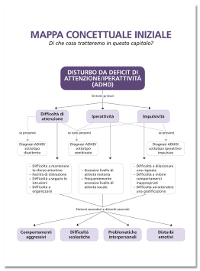 a conceptual map that illustrates the main contents and how they are related
a conceptual map that illustrates the main contents and how they are related
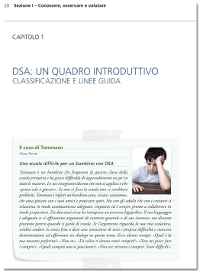 presentation of case examples, through short descriptions, portraying children in their daily typical situations
presentation of case examples, through short descriptions, portraying children in their daily typical situations
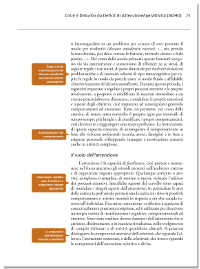 questions and key points alongside each paragraph to tell the reader what it is talked about
questions and key points alongside each paragraph to tell the reader what it is talked about
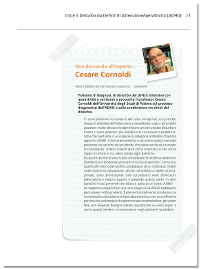 interviews with experts on the most debated and current aspects of the disturbs
interviews with experts on the most debated and current aspects of the disturbs
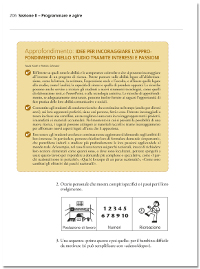 in-depths explanations of meaningful concepts and terms
in-depths explanations of meaningful concepts and terms
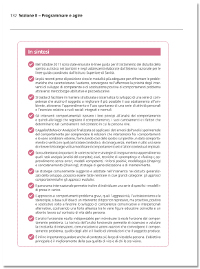 final summary box of the main contents dealt with in the chapter
final summary box of the main contents dealt with in the chapter